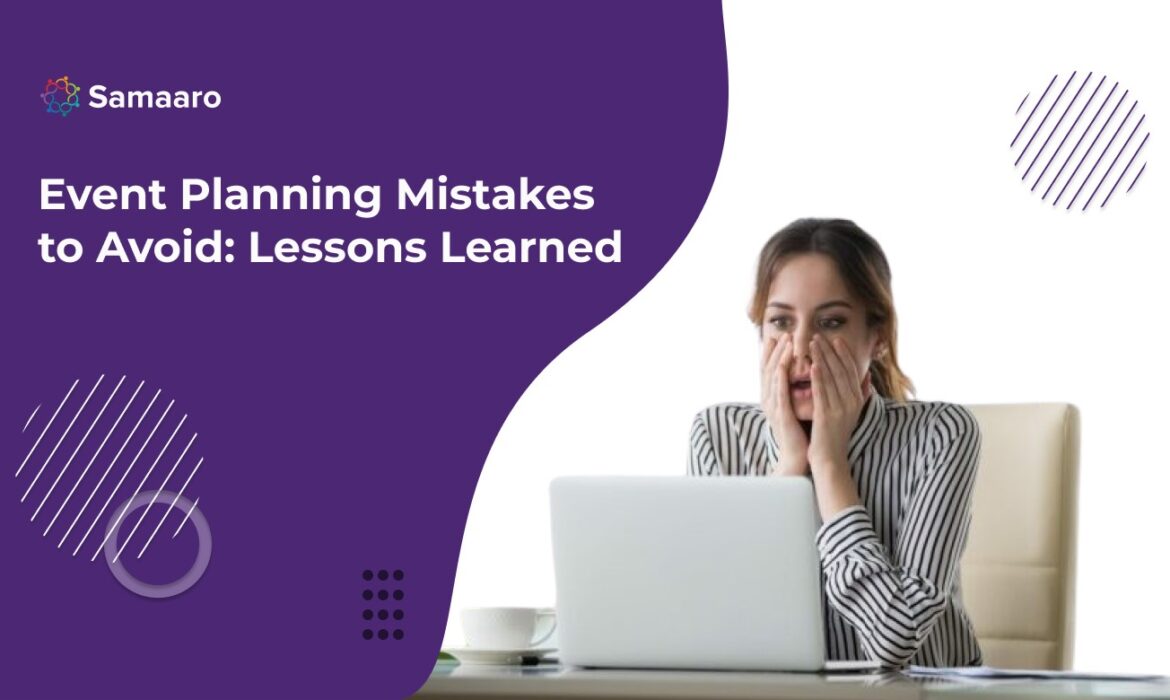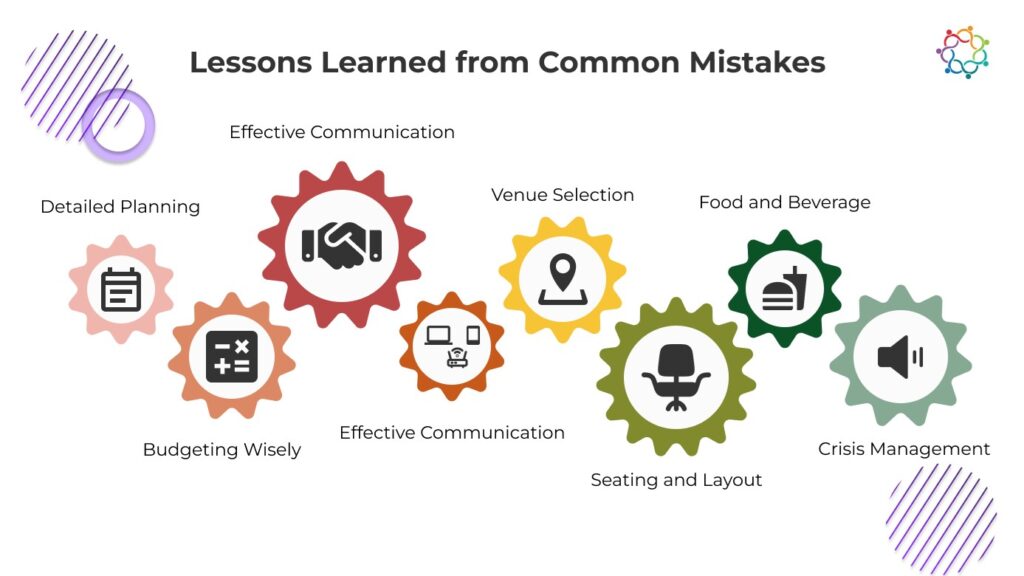Samaaro + Your CRM: Zero Integration Fee for Annual Sign-Ups Until 30 June, 2025
- 00Days
- 00Hrs
- 00Min

Event planning is a multi-faceted process that requires precision, attention to detail, and strategic foresight. From venue selection to budgeting, every decision plays a pivotal role in creating a seamless event experience. However, even with careful planning, common mistakes can lead to issues that disrupt the flow and negatively impact the attendee experience. These errors can stem from underestimating costs, overlooking crucial details, or failing to communicate effectively. When these mistakes occur, they can undermine the event’s purpose, lead to attendee dissatisfaction, and ultimately harm the event’s success and reputation.
Understanding these potential pitfalls is essential for any event planner, whether organizing a corporate gathering, conference, or social event. By recognizing common missteps and applying lessons learned, planners can optimize their approach, ensuring a smoother, more enjoyable event for all involved. This blog will explore frequent mistakes made in event planning, the consequences they bring, and practical steps to prevent them.
Common Event Planning Mistakes

Understanding these common event planning mistakes and implementing strategies to avoid them helps build resilience and create a foundation for successful, memorable events. By paying attention to details, staying organized, and planning for contingencies, event planners can significantly improve their event outcomes and elevate the attendee experience.
Lessons Learned from Common Mistakes

1. Importance of Detailed Planning
A well-structured event plan serves as the backbone of a successful event. Detailed planning involves outlining every aspect of the event, including timelines, task assignments, and responsibilities. By creating a comprehensive checklist, planners can ensure that each element is accounted for, minimizing the risk of oversight. Regular check-ins with the team can also keep everyone updated and accountable, facilitating smoother execution.
2. Budgeting Smart
Budgeting wisely is of utmost importance for an event’s success. Budgeting efficiency begins with a comprehensive look at every conceivable cost…venue rental, food and beverage, marketing, and personnel. Budgeting sources as realistically as possible, even including an amount for contingencies or unexpected expenses if it is something within your budget, enables planners to take on unanticipated costs without placing their budget under strain. This will also allow for greater flexibility at the end of the planning process just prior to the event.
3. Communicate Effectively
Creating a clear communication plan allows planners to keep all parties informed and engaged. Using some communication channels, like emails, progressive project management tracking tools and group messaging can help, if already agreed to by staff, all ensure that your messages are received. Regular updates assist with clarifying assignments of responsibility. Accessibility to open channels decreases the likelihood of misunderstandings. True collaboration is achievable only from open lines of communication and practice of resolving issues, should they arise.
4. Be Technical
Technical matters must be prepared for in today’s digital world. Event planners should anticipate testing to ensure everything is working prior to the event, including audio-visual equipment and Wi-Fi. Having good technical support standing prepared if/when things do not go as planned can help save the day and get the process back on track and keep it running smoothly. Also, have equipment set aside as back-ups to keep the process moving along while maintaining a level of professionalism and acceptable quality.
5. Venue Considerations
The venue can be a significant part of any event’s success. It is critical to carefully check the venue capacity, venue location, accessibility, etc. There may not be a better way of determining venues layout and logistics, instead of visiting the venue in person. This is anticipated in purpose of knowing how/if the venue layout fits your goals for the event. Additionally, the venue parking, transportation, and restroom facilities will greatly improve the attendee experience and help avoid logistical headaches during the event.
6. Seating Plan and Thinking Through Layout
A useful seating plan and layout of the event is very important to your attendees’ interaction with each other as well as degree of satisfaction with the event. During the seating and layout plan, please make sure you maximize the layout, while still allowing for potential networking interaction in some of the floor plans. Additionally, address sightline, access to your speakers or screen, and other comfortable factors to facilitate attendee interaction and contribute experience.
7. Food & Beverage
Real and reasonable concerns regarding the types of food or beverage consumed are another way of reflecting inclusivity and thoughtfulness for attendee that may not last than a few hours. Surveying attendees, or requesting dietary details during registration saves catering time, effort or stress, and providers adequate alternatives on behalf of yourself or planners. Food & beverage requirements allow variety and keep your attendances happy and thus increase the overall event experience as attendees are more likely to stay longer the event of longer experience all attendees.
8. Managing Crisis
An event’s crisis management plan is an important plan in which event planners never want to deal with. Even though we can think of one or many ways that a crisis can be brought up, even at the last minute, it will be a plan that you can use when planning for an event or lesson plan disruption occurs. This plan includes procedural plans for either management or affecting connections, even contingency for the public unexpected cancellations of speakers or speakers. Knowing how fast the sudden opportunity may develop seem overwhelming, having alternative arrangements can put event planners on a better level to think faster and more confident decisions for your own decision to keep moving forward.
Conclusion
Avoiding common event planning mistakes is key to delivering seamless and impactful events. By learning from these errors and applying best practices, planners can continually improve their processes, enhancing each event’s quality and attendee experience. Implementing these lessons will lead to more successful, memorable events and help build a reputation for excellence in event planning.

Built for modern marketing teams, Samaaro’s AI-powered event-tech platform helps you run events more efficiently, reduce manual work, engage attendees, capture qualified leads and gain real-time visibility into your events’ performance.
Location


© 2026 — Samaaro. All Rights Reserved.